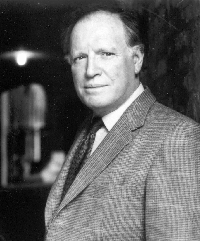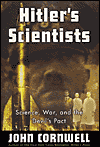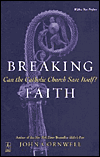
| NYWI HOME PAGE | VISITING WRITERS & EVENTS INDEX | VIDEO ARCHIVES | BLOG |
![]()
 John Cornwell
John Cornwell
NYS Writers Institute, Tuesday, October 14, 2003
4:00 p.m. Seminar | Standish Room, Science Library, Uptown Campus
8:00 p.m. Reading | Recital Hall, Performing Arts Center, Uptown Campus
John Cornwell, the British journalist, science historian, religious affairs commentator and devoted Roman Catholic who once studied for the priesthood, is perhaps best-known for Hitler's Pope (1999), a biography of Eugenio Pacelli, who became Pope Pius XII in 1939. The book, which presents evidence that Pacelli collaborated extensively with the Nazis, spent five weeks on the New York Times hardcover bestseller list and created a storm of controversy, both within and outside the Catholic world.
 Cornwell's newest book, Hitler's Scientists (October 2003) is a penetrating study of the inhumane applications of science in 10th century Germany, both before and during the Nazi regime. Cornwell exposes the degree to which Nazi ideology and practice came to pervade all aspects of Germany's scientific culture, despite Hitler's profound ignorance of scientific principles.
Cornwell's newest book, Hitler's Scientists (October 2003) is a penetrating study of the inhumane applications of science in 10th century Germany, both before and during the Nazi regime. Cornwell exposes the degree to which Nazi ideology and practice came to pervade all aspects of Germany's scientific culture, despite Hitler's profound ignorance of scientific principles.
In researching Hitler's Pope (1999), Cornwell set out originally to write an exoneration of Pius XII, a Pope long accused of not doing enough to oppose the rise of totalitarian governments and the destruction of European Jewry. Cornwell soon became convinced, however, of Eugenio Paella's personal sympathy for Hitler, his admiration of fascist ideologies, and his deep antipathy toward the Jews. Indeed, Cornwell argues that Pacelli, in his capacity as the Vatican's Secretary of State, and as Papal Nuncio in both Munich and Berlin, contributed directly to Hitler's rise to power. Cornwell based his book on materials from heretofore restricted Vatician and Jesuit archives, to which he was granted exclusive access.
". . .the first serious and complete biography of Eugenio Pacelli, Pius XII. . ." - Atlantic Monthy
"By combining the painstaking research of other scholars with his own new documentation. . .Cornwell makes a case in Hitler's Pope that is very difficult to refute." - New York Times

Cornwell is also the author of Breaking Faith: The Pope, the People, and the Fate of Catholicism (2001). The book serves a two-fold purpose. Cornwell presents an analysis, from a liberal Catholic perspective, of the Church's troubled present and uncertain future. At the same time, he explores his own personal relationship with Catholicism, from his youthful aspirations to the priesthood, to his seminary days, to his break with the Church and, finally to his passionate return to Catholic spirituality in middle age. The book addresses some of the leading Catholic debate of recent decades, including the subjects of sexual morality, the power of the laity, and the role of women.
Cornwell's other recent books include The Power to Harm: Mind, Medicine, and Murder on Trial (1996), an account of a murder-sucide rampage in Louisville, Kentucky and the possible role played by the drug Prozac in the incident; Nature's Imagination: The Frontiers of Scientific Vision (editor, 1995), a collection of essays by leading thinkers on some of the grandest questions posed by science; and Powers of Darkness, Powers of Light: Travels in Search of the Miraculous and Demonic (1991), a journalistic account of exorcisms, faith healings and apparitions of the Virgin Mary among the Catholic faithful.
A leading authority on the History and Philosophy of Science, John Cornwell serves as director of the Science and Human Dimension Project at Jesus College, Cambridge University in Cambridge, England. He also writes on scientific, ethical and religious issues for the Sunday Times (London), and for Catholic and religious affairs publications around the world.
Additional Links:
Times Union Article